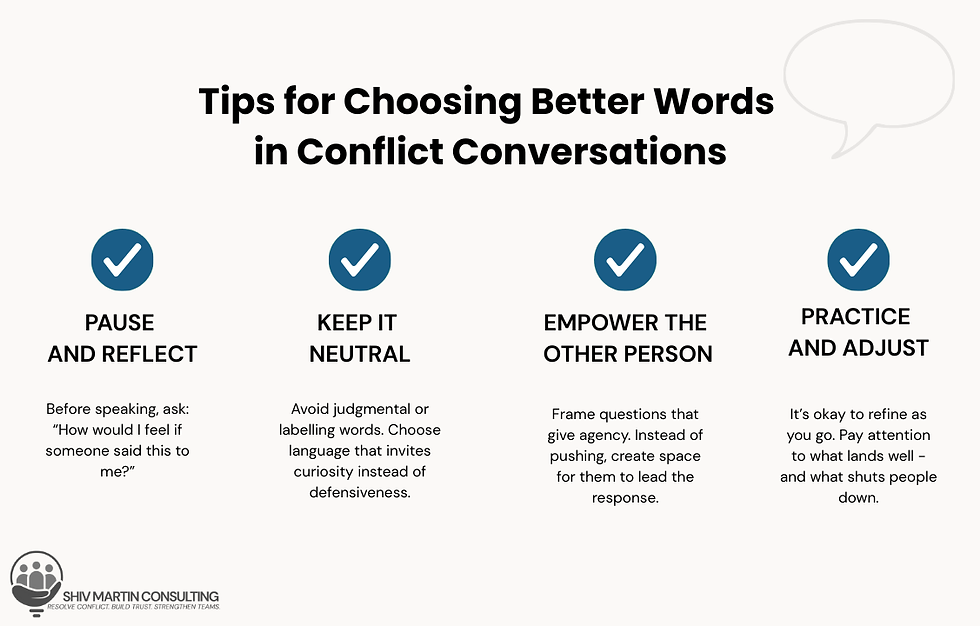The Power of Words: How Do Our Questions Shape Conversations?
- Shiv Martin

- Oct 28, 2025
- 4 min read
Have you ever asked a question and noticed the other person’s reaction shift? Maybe they stiffened, looked uncomfortable, or hesitated. In my work as a mediator and trainer, I’ve seen countless moments like this.
The way we phrase a question can either open up a conversation - or shut it down.
Why Language Matters in High-Stakes Conversations: The Power of Words
When facilitating mediation or giving feedback, words carry enormous weight. We’re not just exchanging information - we’re influencing how others feel, think, and respond.

For example:
“Please be honest with me about how you felt in that situation.”Honesty can sound heavy, even accusatory - like questioning someone’s truthfulness.
“Please feel free to be open with me about how you felt.”Open gives permission without judgment, creating psychological safety.
This subtle shift can completely change how someone engages in the conversation.
Does One Word Really Make a Difference?
Yes. Take the word victim. While accurate at times, it can feel disempowering.
❌ “As a victim of this situation, how do you feel?”
✅ “As someone affected by this situation, how do you feel?”
The second phrasing recognises their experience but avoids labelling them. It leaves room for self-definition, something I’ve seen make a real difference in workplace disputes and personal conflict. Never underestimate the power of words: even a single one.
What Neuroscience Tells Us About Words
This isn’t just semantics - neuroscience backs it up.
Threat words (e.g., honest, victim) can activate the brain’s amygdala, triggering defensiveness.
Inclusive, neutral language engages the prefrontal cortex, which supports reasoning, empathy, and problem-solving.
So yes - even a single word can shift the brain’s response, changing the quality of the entire conversation.
Tips for Choosing Better Words in Conflict Conversations
Over the years, I’ve developed some practical strategies:
1. Pause and Reflect
Before speaking, ask: “How would I feel if someone said this to me?”
2. Keep It Neutral
Avoid judgmental or labelling words. Choose language that invites curiosity instead of defensiveness.
3. Empower the Other Person
Frame questions that give agency. Instead of pushing, create space for them to lead the response.
4. Practice and Adjust
It’s okay to refine as you go. Pay attention to what lands well - and what shuts people down.

What About You?
Have you noticed how much phrasing shapes a conversation?
Have you reworded a question and seen a completely different response?
Are there words or phrases you avoid because they tend to backfire?
I’d love to hear your experiences. Share them in the comments or reach out - let’s keep exploring how we can create more open, trusting, and productive conversations.
❓ Frequently Asked Questions
1. Can one word really make that much difference in conflict resolution?
Yes. Words can activate threat responses or build trust - especially in emotionally charged settings.
2. What’s wrong with asking someone to be honest? Nothing inherently. But in high-stakes conversations, it may imply distrust. “Open” or “share freely” can feel more collaborative.
3. Why avoid the word victim? It can feel disempowering or prescriptive. “Person affected” acknowledges harm without assigning an identity.
4. Are there specific words that help build rapport? Yes - words that emphasise choice, safety, and empathy (like “what matters to you,” “how do you see it,” or “feel free to share”) encourage engagement.
5. Do you offer language or communication workshops?
Yes. I run custom training sessions on communication, emotional intelligence, and conflict resolution across sectors. Find out more about my training here.
You know that feeling when workplace conversations just aren't working?
I see it all the time - leaders who genuinely care about their teams, but find themselves stuck when tensions rise or communication breaks down.
Here's what I've learned:
The best workplaces aren't conflict-free. They're places where people know how to navigate disagreement with respect and understanding.
Through Shiv Martin Consulting, I help leaders develop skills to handle conflict resolution training, facilitate high-stakes conversations, and transform disputes into opportunities for stronger relationships. Check out my latest events on how I support leaders to handle conflict.
Every conflict tells a story about unmet needs and different perspectives. When we approach workplace tensions with curiosity instead of judgment, teams don't just function better - they grow stronger.
Ready to shift the conversation in your workplace?
Let's start with a free consultation. Reach out at shivmartin.com.au or contact@shivmartin.com to explore how we can work together. 📅 Book a free consultation
Free Resource: DIY Facilitated Conversations
If you’d like to see how facilitated conversations could help your workplace, I’ve created a free resource: DIY Facilitated Conversations.
This guide outlines the key steps of running a structured conversation, with prompts and tips you can use straight away.
Shiv Martin is a nationally accredited mediator, practicing solicitor, conciliator, decision-maker, and certified vocational trainer. With extensive experience in complex dispute resolution, stakeholder engagement, and team building across business, community, and governmental sectors, Shiv brings over a decade of unique and diverse expertise in Law, Management, Vocational Education, and Mediation.







Comments